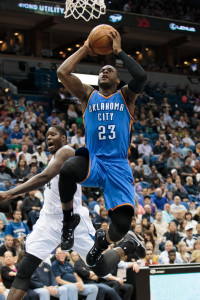The top three picks of the 2012 draft have already established themselves as top-level talents during their first three seasons.
Top pick Anthony Davis quickly emerged one of the league’s crown jewels, a budding superstar who agreed to a max entension with the Pelicans at the eve of free agency this summer. Michael Kidd-Gilchrist has become the Hornets’ defensive linchpin, and the two parties agreed on a four-year, $52MM extension this summer. Bradley Beal and the Wizards have not come to terms on a extension, but he’s one of the most feared shooters in the league and should eventually receive a contract at or near the max.
The No. 4 pick of that draft, Dion Waiters, finds himself in an entirely different situation after three disappointing seasons to start his NBA career. The Cavaliers thought they had their backcourt for the next decade when they drafted Waiters to pair up with Kyrie Irving. Instead, the duo reportedly failed to click on a personal level and never developed the on-court chemistry that the franchise had envisioned. Cleveland shipped Waiters to the Thunder during last season, offering the 6’4” shooting guard a fresh start.
While Waiters appeared to be more content with his new surroundings, it didn’t translate to on-court success. He averaged 10.5 points in 23.8 minutes while shooting 40.4% from the field and 25.6% from 3-point range prior to the deal last season. With the Thunder, he averaged 12.7 points in 30.3 minutes while shooting 39.2% overall and 31.9% from long range. He regressed from his second year averages of 15.0 PPG, 43.3% overall shooting and 36.8% on threes. His ESPN Hollinger PER rating of 10.93 last season was well below the league standard of 15.0 and 59th among shooting guards.
Other advanced metrics show how much work Waiters must do to improve his game. He ranked 85th out of 91 in ESPN’s Real Plus/Minus rating for shooting guards last season. Waiters’ VORP (Value Over Replacement Player) rating calculated by Basketball Reference was a minus 0.9, compared to minus 0.5 in his rookie season and 0.0 in his second year. His Offensive Box Plus/Minus Rating has been below zero in each of his seasons, including a career-worst minus 2.1 last season. His Defensive Box Plus/Minus Rating was a minus 1.5, though that was actually an improvement over his first two seasons.
Waiters can carve out a niche as a volume scorer but he has to be more efficient and take better shots. His midrange game certainly needs some work. He’s taken just 16.2% of his shots from 3-16 feet during his first three seasons, making just 29.4% from 3-10 feet and 41.3% from 10-16 feet. His 3-point shooting needs to at least return to the form he showed in 2013/14.
He also needs to create more for his teammates. He had 3.0 assists per game in that 2013/14 season, but that dropped to 2.0 last season.
Despite those statistical drawbacks, Waiters has gained a measure of respect from the Thunder organization. They are reportedly willing to give him a rookie scale extension before the November 2nd deadline if he’s willing to offer them a discount. For his part, Waiters has expressed excitement over the hiring of Billy Donovan as head coach and the veteran staff Donovan brought in. Waiters, who will make $5,138,430 this season, believes the new staff will help him expand his game.
Waiters should have a prominent role with the Thunder this season, though it remains to be seen how he’ll mesh with a healthy Kevin Durant and Russell Westbrook. Waiters bristled in Cleveland over his catch-and-shoot role, but he’d have a similar role if he’s in the starting lineup with two of the league’s most dynamic scorers. He’d probably be more comfortable as a sixth man with only one of them off the court, which would afford him more scoring opportunities.
If Waiters doesn’t accept the discount, he may opt to gamble on having a strong season and then become a restricted free agent next summer. With the salary cap spiking upward, he could get a multiyear offer sheet from an offensively challenged club and gain long-term security, whether or not the Thunder decide to match. It’s an interesting choice, or perhaps dilemma, for a player who has not come close to living up his draft status.

I see it as a matter of flexibility for the Thunder. I think they could get a bargain here, since I don’t think we’ll see Waiters’ stock sink much lower, but the more flexibility they have during Durant’s summer of free agency, the better, whether he stays and wants to pick some new teammates or goes and the team has to replace him.
Dion Waiters = a younger Nick Young/ Lou Williams type…His contract should be in line w/ their average annual values ($5-7 mill/year) with the inflated salary cap pushing that number up to around $8-10 mill/year
That sounds about right for Waiters. I think the Thunder would be comfortable with those figures, especially if he’s willing to make improvements to his game.